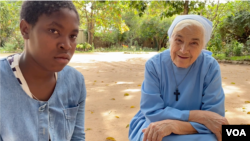Like many 14-year-old girls, Sifa Maulana had a dream. Hers was to become a nurse.
Her family didn’t support Sifa’s ambitions.
"My grandmother said, ‘If you don't want to get married, you better leave now.' I packed my clothes, asked my brother-in-law for 100 meticais” — about $1.60 — “and went to the bus stop," said Sifa, who faced the ultimatum in May.
Sifa left her home in Mutuali, a village in Mozambique’s northern province of Nampula, and took the bus to Malema town. There, she went to a Catholic church to pray — and confided in nuns there about her situation. She told them her older sister was studying to join a religious order at the Mater Dei Monastery in Nampula town. The nuns at the church confirmed Sifa’s connections and sent the girl to the monastery, where she was welcomed in mid-May.
"We introduced her to other girls here at home,” said Mother Maria, a member of the Contemplative Community of the Servants of Mary. She did not disclose Sifa’s biological sister’s name or make her available for an interview.
Sifa was doing well after roughly a week at the monastery, Mother Maria told VOA Portuguese on May 30. “She helps, she takes care of the babies at the orphanage. But now we need to decide how to get her school records so she can continue her studies.”
The threat of early marriage and disrupted education is all too common, said Mother Maria.
"It is very worrying because there is oppression. Women in general have always been oppressed. Premature marriage is happening a lot,” she said. To lessen their financial strain, families — especially poor families — “want to quickly put children out of the house, taking mouths out of the house.”
The coronavirus pandemic has heightened the risk of child marriage around the world in communities “affected by economic shocks” and with “limited access to basic services such as health, education and child protection,” UNICEF, the United Nations’ children’s agency, reported last year. The U.N. estimates the pandemic could lead to as many as 13 million additional child marriages between 2020 and 2030 that otherwise might have been avoided.
Mozambique already “has one of the highest rates of child marriage in the world, affecting almost one in every two girls,” UNICEF reported.
Child marriage not only usually ends schooling for girls but also increases their vulnerability to domestic abuse and violence, UNICEF warns. The practice also endangers girls’ health if they bear children before their bodies are fully mature and if they contract sexually transmitted diseases, including HIV/AIDS.
In 2019, Mozambique outlawed marriage for anyone younger than 18. But the law is seldom enforced and violations are rarely reported, said Nzira de Deus, executive director of Fórum Mulher Mozambique, a national network of women’s rights organizations.
Several factors complicate the law’s implementation, Deus said.
First, there’s a lack of awareness, and of social acceptance, that girls have the right to freedom of choice, she said. Second, “macho culture camouflaged with harmful social and cultural practices … undermine women’s human rights.”
Finally, according to de Deus, there is “impunity due to the … weak response services to complaints about forced and premature unions."
Nonetheless, the network urges reporting to authorities any cases of underage marriage that are being planned or have taken place.
For now, Sifa has averted an unwanted early marriage, and Mother Maria said the religious order is committed to helping the girl continue her education: “We must help her going forward so she can be someone in life.”
This report originated in VOA’s Portuguese Service.









